|
The man cast a giant shadow. Most of us never
met Colonel Jeff Cooper, but the ramifications of his
thoughts and techniques will be felt for years to come. Cooper
profoundly influenced the thinking of the shooting world and in
some cases he saved our lives. Even if you did not attend one of
Cooper's schools his writing and his books were distance
education well worth their modest price.
I do not count these works as Cooper's writing but rather
as Cooper's thoughts. I grew up reading the works of Keith
on hunting and Skelton on police work. Askins was
an acerbic wit I enjoyed, but I am not certain just what I
learned. Jordan clearly had good points. But Cooper was
the odds on favorite source of information for those of us who
had decided to take total responsibility for our own safety.
Cooper taught us how to prevail at arm's length affairs. He
understood the balance
of weight and bulk that armed civilians will tolerate and
cautioned against the less effective calibers.
Cooper did what had not been done before. He
made an intellectual study of pressing strategic struggle on a
personal level. He had the intelligence needed for analysis and
the force needed to inspire. He leveraged his educational and
military background for all of us into a consensus of what was
needed in personal defense. I learned about awareness from
working the street, but I went there with Cooper's color codes
and warnings
of combat awareness well rooted in my mind. I was able to enjoy
life more through this alertness and to make cases by
observation. On more than one occasion this awareness saved my
life. There are faint warning signs that arise from the mass of
background noise and when you connect the dots the whole picture
is there for those who care to see.
The signal for an impending attack may be ambiguous or it
may not, but for us to prearrange actions that are right for our
defense and that are feasible is certainly something we should
do. We also understand that early signs of an attack may be
false, which is why we do shoot no shoot drills and practice
keeping a clear head.
Strategic thinking allows useful preparatory
measures. These measures could not be possible if we did not
think strategically. And that is what Cooper did. Thinking
tactically is fine once we are in hot water, but if we think
strategically we will be ahead of the game. As I read Cooper's
work I saw the one great difference in Cooper's promises. I knew
that I would not gain proficiency in one fell swoop but that my
skill would build quietly and cumulatively. In a writing world
dominated by cops and hunters, Cooper was a brilliant exception.
Cooper was well-read and charming in a day when much of what was
written was as charming as a concrete berm. I read his work
voraciously, often keeping one of his books in the cruiser as I
chased some perp in a real or imagined pursuit of crime. Many of
them were big timers in their own mind. I worked with people who
were much like myself, perhaps clever and ballsy but not
intellectual. The clever cops reminded me to watch for the bad
guy's ratline. The ratline was simply a means of getting
away if all else failed. The ratline may be an escape route, a
stooge or an alibi...or it may be a pistol. The discovery that
some thugs were well armed and proficient at arms was a little
disconcerting, but after seeing my second thug with a nickel
plated .45 Colt automatic I began to understand the need
for practice and parity.
I
also began to understand that the public really didnít care
for cops very much. They tolerated us more than anything else,
and with my background in the study of the human mind, I began
to understand that much of the admiration the liberal left has
for the criminal class is homoerotic.
Some professional types who do not deal with the thug
think they are free of dark impulses but on the other
hand they envy the thug's life in many ways. Macabre as Poe
and as cruel as de Sade, the warped side of
humanity has more twists than O Henry. Cruelty and
morbidity are their stock in trade.
With Cooper's demands for proficiency firmly
installed in my hard drive, I learned that if we participate in
violence we must have a regard for the consequences. I have
quite a few scars. When younger the chicks digged scars, but now
the scars lend a certain character. I think of some of the bad
guys I dealt with a generation ago. Their games
are now long thwarted, often hideously so. There is a kind of
rough justice in the world quite outside the criminal justice
system. Violence casts a long shadow over many of our brothers
and sisters. The wrong type of man preys upon them with no pang
of conscience. As a
young cop I tried to make sense of things I could barely
imagine. Those
living in poverty have prospects are largely tied to their
attitude. But crime is always there to influence that attitude.
I
became something of a deep thinker as many cops do on those
lonely nights. Cooper
was responsible at least in part for this thinking, although
comrades who went on to other professions also influenced my
decisions. I think of Cooper often as I train tactical
hypochondriacs who arrive on the field with a high capacity 9mm,
four magazines, a back up pistol and two tactical knives. I
donít need to call in help for the diagnosis -
but they may have seen too much television or read the
wrong book. Some
are wannabes but others donít have a clue. As for the
wannabes, listen, I have been there and it isnít easy being
me. Cooper gave us something to aspire to. By following his
rules we have quite enough to aspire to without changing the
program. Naturally there are irrelevant issues that come to the
forefront such as point shooting and that have to be shot down
forcefully for the welfare of the student, then and now, and we
have to stay sharp. The Colonel would like it that way.
The
Consensus
Colonel
Cooper always gave credit to others, whether it was the FBI's
contribution to training or a colleagues invention. Colonel
wrote with the editorial WE that editors find stilted. Yet, he
carried it off well and I am certain he often wrote with the
full weight of a consensus of experts behind him. Cooper felt
that the 1911 .45 auto was the best fighting pistol of all time.
Nothing has changed my mind on that score. However, when I look
at my Springfield Loaded Model with Novak sights,
ramped barrel, forward cocking serrations, beavertail safety,
and butter smooth trigger, I find little resemblance to the GI
.45. Still, it is a 1911. Cooper's pistol logic led to a
consensus of what was needed in a combat pistol. A good set of
sights, a speed safety, and a good trigger. That is still what
is needed, and there are very good pistols of the type that
Cooper would approve of. In Cooper's day, it was common to pin
the grip safety shut since some shooters missed the grip safety.
Today, we have beavertail grip safeties to cure the problem. I
appreciate the grip safety too much indeed to tape it shut and
appreciate the beavertail.
Cooper
on Stopping Power
There have been outrageous claims on minor
caliber stopping power that must be taken with a grain of salt.
I do not subscribe to any document with hidden, secret sources
and unrepeatable unverifiable events. I have shot all types of
game with the .45 and engaged in interpersonal combat. I cannot
agree with Colonel Cooper more on the .45. I suppose
since I have not shot drugged goats I am behind the times - but
I doubt anyone else has done so either. The .45 ACP cartridge
remains as well balanced and effective a defensive cartridge as
we are likely to produce. Those advocating the small bores
either have no personal experience in the problem, or they do
not understand the problem. I do not necessarily carry the loads
Cooper recommended. There is nothing wrong with hardball and the
Hornady 230 grain Flat Point that Cooper preferred is a
fine, accurate load. But we do have reliable expanding bullets
and we should take advantage of them. Bill Wilson finds
the 200 grain XTP at 1,000 fps at ideal loading and Wilson
Combat offers the same as a custom loading. I think the
Colonel would probably give a nod on that one but I am not
certain. Certainly quality of manufacture and attention to
detail must be respected in a combat cartridge.
The
Hatcher Scale
A rather reputable mathematical formula that was
booed by the junk scientist who once found voice in print is the
Hatcher Scale of Relative Stopping Power. Julian Hatcher
quite simply was a very experienced solider and experimenter
whom Cooper obviously admired.
In a sense, Hatcher's work and writings were in
perspective much the same to Cooper's generation as he was to
ours. Hatcher was quite confident in his formula. Another
soldier who served in the Philippines and saw much conflict was Colonel
Thompson, the man credited for the Tommy Gun and also
an architect of victory in World War One due to his faultless
organization of war time weapons production. Thompson is more
responsible for the .45 ACP cartridge than he is given credit.
In any case, neither man thought much of the cheaper and easier
to control small bore cartridges. Colonel Cooper reduced
hatcher's scale to a 'short form'. The original calculated
bullet mass and weight and velocity multiplied by the constant
of gravity. There was a formula
that accounted for bullet expansion. Cooper shortened the form
to give a passing score at 20, while the original was more
cumbersome.
Here
is the formula:
Bullet
weight times
velocity times frontal diameter. Then, add 25% for bullet
expansion.
As an example, 160 times 1000, round off, gives
16. Add
25% for bullet expansion and you have 20.
A
really hot .38 or a standard .357 made the scale.
The
.45 is a fine cartridge based on historical and factual
evidence. The Hatcher scale simply confirms this. The Hatcher
scale was something Cooper respected.
After
the Miami shootout in which good FBI agents were slain by
killers, Cooper disdained the small bores and reported the main
creep had taken fourteen hits. An up and coming writer noted
that Cooper should get his facts straight, the man was shot
twice and it could happen with any bullet. When a complete study
was released months later, Cooper's report was proven correct.
I am sure the Colonel had contacts at Quantico. Cooper
reported factually and probably didnít understand why others
did not. We are all allowed our own opinions, but not our own
facts.
There
is a lot more, and like many of you, the light went off when I
deciphered Cooper's work. Will there be another like him? When
you consider the awesome tasks our armed forces are assigned and
the quality of the educational system in America, almost
certainly another like him will rise, but whether he will choose
to write in our field is not question. I certainly am not making
light of Colonel Cooper's achievements, but there are many great
Americans and I see much that is great in the young generation.
I
said all of this in a chapter on Colonel Cooper in my book THE
1911 AUTOMATIC PISTOL from Stoeger Press, years
ago. If you find time pick up a copy. I hope you enjoy it.
R.K.
Campbell
  
Got something to say about this article? Want to agree (or
disagree) with it? Click the following link to go to the GUNBlast Feedback Page.
|
|
Click pictures for a larger version.
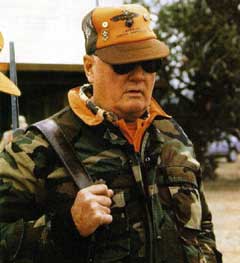
Colonel Jeff Cooper.
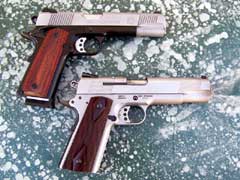
The
modern 1911 owes much to Colonel Cooper. Novak sights,
beavertail safeties and good triggers are practically the norm
in high end .45s these days.
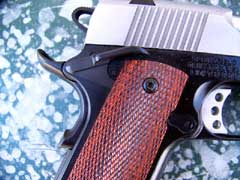
The
beavertail grip safety and ambidextrous safety of the
Springfield owe much to competitive shooting founded by
Colonel Cooper.
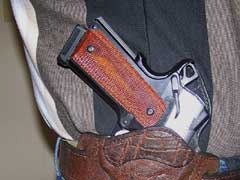
The
author often carries his cocked and locked lightweight frame
Government Model in a Wellsmade holster. This is as
good as it gets.
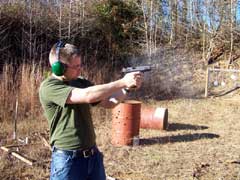
A
sight to gladden the heart - a young soldier with five years
in firing a 1911 .45.
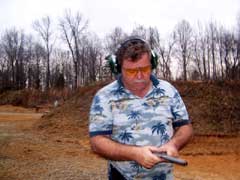
The
author appreciates the 1911 more, not less, each time he
examines a new example of the breed.
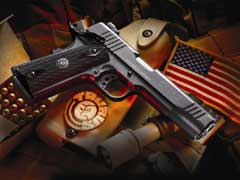
Will
a new 1911 soon be issued - and might it be a Taurus
PT 1911? We could do much worse- and in fact, we
already have.
|
![]()